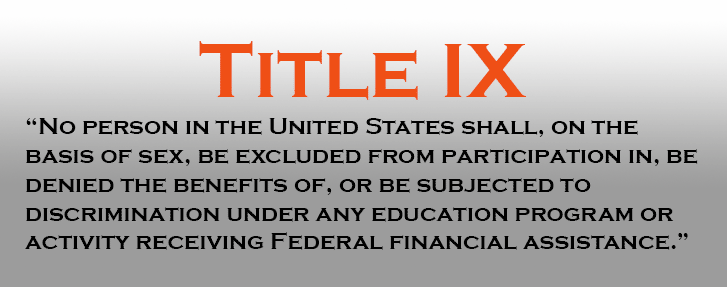
Title IX and the Administrative State
In my last post, I noted that state regulation in the United States, while often lighter than in European democracies, has been very intrusive in the area of civil rights. It is in this realm that regulation has raced ahead of public opinion, and even ahead of Supreme Court judgments regarding the limits of federal action. The best illustration of this is the steadily expanding interpretation of Title IX.
This issue has been addressed by Shep Melnick, a professor of American politics at Boston College, in a fascinating 2018 book entitled The Transformation of Title IX: Regulating Gender Equality in Education. Melnick points out that Title IX constitutes a single clause in the Education Amendments of 1972 that prohibits federal funding for entities that discriminate on the basis of gender. It was modeled on Title VI of the 1964 Civil Rights Act that similarly banned discrimination on the basis of race. It turned out that gender was different from race; “separate but equal” was unthinkable in the latter case, but needed to apply to gender when considering things like collegiate sports. And indeed, the controversies surrounding Title IX over the next couple of decades centered around what constituted non-discrimination in varsity collegiate sports.
___STEADY_PAYWALL___
It was only in the 2010s that Title IX came to be applied to sexual assault and sexual harassment. In 2014 the White House issued a report charging that there was an epidemic of sexual assault on U.S. college campuses, an issue that affected the broader culture after revelations of the outrageous behavior of Harvey Weinstein and the rise of the #MeToo movement. The Obama administration’s Office for Civil Rights (OCR) in the Department of Education began to issue an increasingly detailed set of guidances concerning how colleges and universities were to deal with this issue, leading most to set up Title IX offices to ensure compliance.
There is no question that these new rules were dealing with a real problem, though the empirical basis of the claims of a "rape epidemic" were subsequently challenged. OCR's efforts received strong support from the educational establishments being regulated, as well as from students and faculty across the country. There were two problems with the approach taken, however, that got to the heart of the critique of the administrative state.
The first problem had to do with the illiberal nature of some of the new rules being promulgated. One "Dear Colleague" letter, for example, recommended adjudication of sexual assault charges using a single investigator model, in which the accused had no clear right to a hearing, counsel, cross-examination, or other procedural protections. As universities sought to implement these rules, law professors at Harvard, the University of Pennsylvania, and other schools expressed astonishment at the lack of due process. Moreover, the guidance defined sexual harassment very broadly to include speech acts that created a discriminatory “hostile environment.” There are certainly speech acts that do have this effect, but others that constitute legitimate forms of speech presumably protected by principles of freedom of speech and of academic freedom, to which universities are supposedly dedicated.
Beyond these substantive problems, all this new rule-making stood on very shaky legal and constitutional grounds. The regulations completely bypassed the requirements of the Administrative Procedure Act, which as noted in the last post was designed to limit bureaucratic discretion. The new rules took the form of “Dear Colleague” letters issued by the Office for Civil Rights, and claimed to be simple interpretations of well-established existing laws. In one case, OCR rejected the limitations on its own authority laid down by the Supreme Court itself. This provided perfect grist for the mill of conservative critics of the administrative state, who argued that bureaucrats and courts were undermining the American constitutional order.
These controversies over Title IX might seem to be of limited significance since they have applied only to higher education. But they are leaching out into much broader sectors of the society. This issue has had an outsized impact on American politics because it constitutes the one area of regulation in which charges of an overreaching administrative state seem totally valid. American public opinion has shifted substantially in the direction of taking seriously the whole issue of sexual assault and harassment. It has rightly supported the broadening of our understanding of civil rights in a series of statutes over the years. But there have been plenty of documented cases where charges against young men were later shown to be far more ambiguous than alleged and where falsely accused individuals suffered. It is not clear that the general public supports the hundreds of pages of detailed guidance that the federal government has issued that led to these outcomes. This is a case where unelected bureaucrats and judges have “leap-frogged” the legislative process, in a way that gives support to the conservative narrative of bureaucratic tyranny.
Let’s be clear. The biggest immediate threat to the American constitutional order lies in Republican efforts to reduce voter access and award themselves control over the counting of votes. But the expansion of Title IX has also weakened the constitutional order by transferring responsibility for important areas of social policy from Congress to the bureaucracy in ways that ultimately weaken the rule of law. Title IX guidance presents itself as the fulfillment of liberal principles of equal treatment, but in practice it has been carried to the point of undermining liberal principles of due process, equal treatment before the law, and freedom of speech. In addition, there is an issue buried within Title IX discourse that runs at cross purposes with liberal protections of privacy and diversity, which I will deal with in a later post.
American Purpose newsletters
Sign up to get our essays and updates—you pick which ones—right in your inbox.
Subscribe






